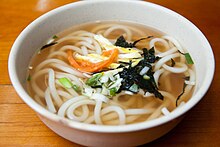Garak-guksu
Appearance
(Redirected from Garak guksu)
 | |
| Type | Guksu |
|---|---|
| Region or state | korea |
| Associated cuisine | Korean cuisine |
| Similar dishes | Udon |
| Korean name | |
| Hangul | 가락국수 |
|---|---|
| Revised Romanization | garak-guksu |
| McCune–Reischauer | karak-kuksu |
| IPA | [ka.ɾak̚.k͈uk̚.s͈u] |
In Korean cuisine, garak-guksu (가락국수) are thick wheat noodles and noodle dishes made with thick noodles.[1]
Preparation
[edit]The dough is typically made from wheat flour and salt water only.[2] Traditionally, 360–540 millilitres (13–19 imp fl oz; 12–18 US fl oz) of salt is added per 1.8 litres (0.40 imp gal; 0.48 US gal) of water.[2] The dough is rolled and cut with a knife.[3]
The noodles are boiled in malgeun-jangguk (맑은장국), a soup soy sauce-based beef broth made with seasoned ground beef stir-fried in sesame oil and usually served with toppings such as egg garnish and eomuk (fish cakes).[2][4]
Garak-guksu can be enjoyed cold, in which case the noodles are rinsed in icy water after they are boiled.[2]
Types
[edit]- Naembi-guksu (냄비국수; "pot noodles") − garak-guksu boiled in a pot.[5]
- Udong (우동) – Korean adaptation of udon, a Japanese noodle dish.[6]
See also
[edit]References
[edit]- ^ "garak-guksu" 가락국수. Standard Korean Language Dictionary (in Korean). National Institute of Korean Language. Archived from the original on 24 February 2017. Retrieved 23 February 2017.
- ^ a b c d "garak-guksu" 가락국수. Doopedia (in Korean). Doosan Corporation. Retrieved 6 May 2017.
- ^ 박, 현진 (28 March 2017). "[아하! 이 음식] 서양의 파스타, 국수에서 유래했다?". The Chosun Ilbo (in Korean). Retrieved 6 May 2017.
- ^ "malgeun-jangguk" 맑은장국. Standard Korean Language Dictionary (in Korean). National Institute of Korean Language. Archived from the original on 15 April 2017. Retrieved 6 May 2017.
- ^ "naembi-guksu" 냄비국수. Standard Korean Language Dictionary (in Korean). National Institute of Korean Language. Retrieved 23 February 2017.
- ^ "udong" 우동. Standard Korean Language Dictionary (in Korean). National Institute of Korean Language. Archived from the original on 24 February 2017. Retrieved 23 February 2017.
